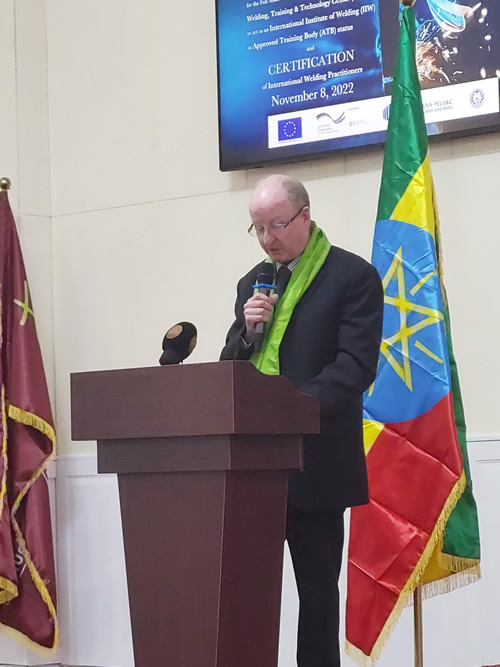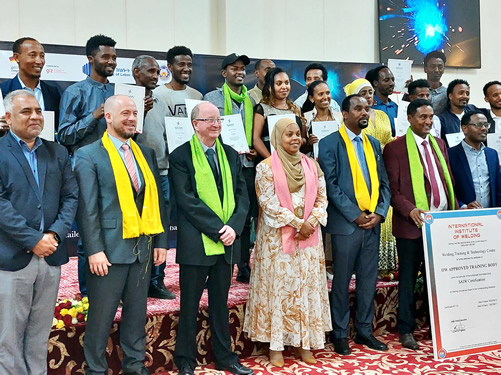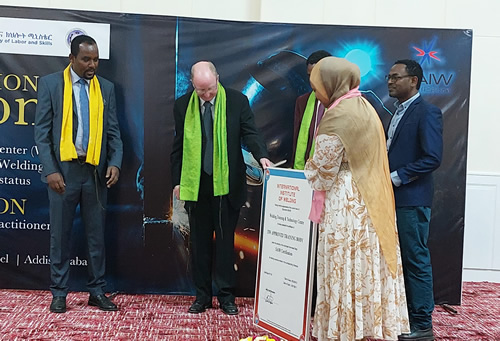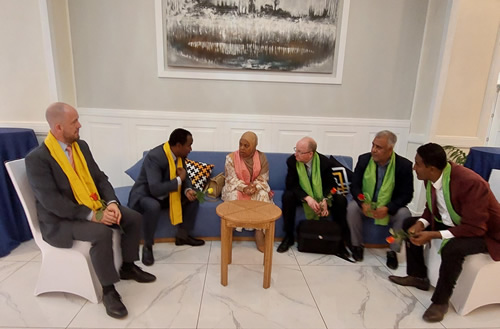SAIW Celebrates Key Role in Ethiopian Welding ATB Status

SAIW Executive Director John Tarboton was proud to give the keynote address at the recent Ethio-German Sustainable Training and Education Programme Event in Addis Ababa, Ethiopia. This was to celebrate that country’s Welding Training and Technology Centre acquiring ATB Status through the SAIW. It was also the graduation ceremony of 89 International Welding Practitioners who were trained by SAIW. Here is the speech John gave where he focused on welding as an ‘enabling technology’ in South Africa and across the continent as it creates economic growth and development and through that, the creation of quality, in-demand, well-paid jobs.…
“Your excellencies, distinguished guests, ladies and gentlemen.
It is an honour to be here today to celebrate the Approved Training Body status of the Welding Training and Technology Centre. This is a great achievement for all involved and we look forward to when WTTC becomes the Ethiopian Authorised Nominated Body of the International Institute of Welding.
Developing a country’s, and indeed our continent’s, National Welding Capabilities is vital to our development. You see, welding is an enabling technology. It allows manufacturing, mining and construction to take place. This in turn creates economic growth and development and through that, the creation of quality, in-demand, well-paid jobs.
This theme of welding as an enabling technology can be developed further. If we have a look at the United Nations 17 Sustainable Development Goals (the so-called UN SDGs), we can see how these goals were designed to be, and I quote “a shared blueprint for peace and prosperity for people and the planet, now and into the future.” Unquote. The SDGs emphasise the interconnected environmental, social and economic aspects of sustainable development.

At the Southern African Institute of Welding, we took that as a starting point and investigated in our own country, how welding as a key enabling technology, allows the progression of each of these goals to contribute to the sustainable development of South Africa. A report has been completed and is now available on our website. Similar reports have been generated by other member countries of the International Institute of Welding.
I am also part of a Working Group of the International Institute of Welding where we are studying the role of welding in progressing all 17 UN SDGs within a global context. We have identified projects that could drive sustainable development with a focus on those projects where welding is a key technology. Ultimately, we aim to show how welding improves the quality of life.
But let me go back to the core of what we are talking about today – the International Welder and the people who become International Welders.
I think we can all agree that it is not easy to perfect welding. It is a skill, and a craft, that combines art and science. Mastering welding requires dedication, patience and determination.
So, I was talking to a couple of our International Welders who graduated this year to hear their stories and understand their views. One was a drummer in a band. With the COVID-19 lockdowns, he was without a job and was looking for an alternative career. His father, also a musician, had a great misfortune when his house burnt down in 2020.
Luckily it was insured and with part of the pay-out, he sent his son to the Southern African Institute of Welding to become an International Welder. But the son was frightened of the theory training and the exams because he is dyslexic.
 One of our Welding Instructors is a motherly figure and she assured him that he could do it and gave him the courage and confidence to try. He made it and was overjoyed that this was just about the only exam that he had passed and he considered that becoming an International Welder was his greatest achievement.
One of our Welding Instructors is a motherly figure and she assured him that he could do it and gave him the courage and confidence to try. He made it and was overjoyed that this was just about the only exam that he had passed and he considered that becoming an International Welder was his greatest achievement.
The other International Welder graduate has a marketing degree and was working in the corporate world until Covid hit and he was retrenched. He had always wanted to work with his hands but had been in a terrible car accident and had broken more than twenty bones in his body, including badly damaging his left hand permanently. He wanted to become an International Welder but welding is a two-handed operation.
For the drummer that I mentioned earlier, this was no problem. However, for this aspiring welder, it meant there was an even greater challenge. But he managed to achieve the seemingly impossible. He told me that he was far prouder of becoming an International Welder than when he obtained his marketing degree. He felt it was a far greater achievement.
I think most of the International Welders that I talk to are most proud that they are creating things through their welding and that they are part of something far bigger than themselves. Whether they are helping to build a power station, fabricating a pressure vessel or working in a factory manufacturing motor vehicles, this same sense of pride, purpose and achievement comes through.
 So as the Welding Training and Technology Centre embarks on your International Welder training, remember that although you are contributing to the economic growth and development of Ethiopia, there are always people at the centre of it and they all have their own story. Becoming an International Welder will change their lives.
So as the Welding Training and Technology Centre embarks on your International Welder training, remember that although you are contributing to the economic growth and development of Ethiopia, there are always people at the centre of it and they all have their own story. Becoming an International Welder will change their lives.
Finally, I would like to assure you that SAIW, the Southern African Institute of Welding, is here for you, to assist in whatever way we can and ultimately to see you become an Approved Nominated Body of the International Institute of Welding.
Thank you, distinguished guests, ladies and gentlemen.


